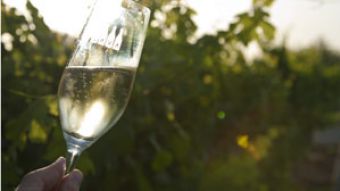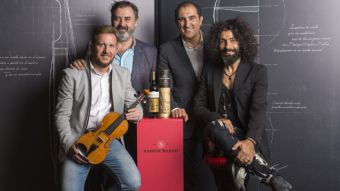Álvaro Palacios: "Great classic wine is made not by man, but by the vine"
It is perhaps not surprising that a man born above a winery in Rioja should have dedicated his life to wine. Born into a traditional winemaking family, he studied in France and California, and combines his personal businesses in Bierzo and Priorat with running the Palacios Remondo family winery in Alfaro (Rioja). As we walked through his Rioja vineyards, he spoke to me, with passion and enthusiasm, about the soil, the importance of old vines, tradition and the great classic wines, of which he is a fervent champion and regular drinker.
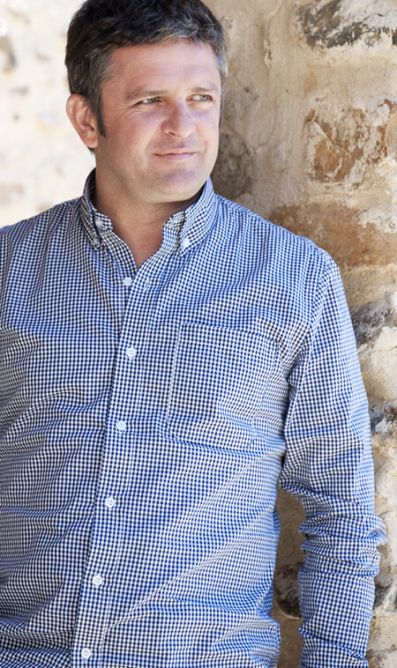 How did you get started in the world of winemaking?
How did you get started in the world of winemaking?
I was born above the winery, we are nine brothers and sisters and four of us work in the wine industry. The family tradition is important to all of us, wine has always been part of our lives. I studied oenology in France and I was so fascinated by the respect the French show for their traditions and soils that it has stayed with me for life.
So you attach particular importance to the wine's terroir of origin ?
That’s right, I think people have to know where a wine comes from, the order of priority from the bottom up should be : country, region, district area, specific local area and single estate. In fact, when you take a Burgundy Musigny, for example, you don't think "Pinot Noir", you think of that specific location. I have become a traditionalist in our viticulture, I understand and appreciate the fact that great classical wine is made not by man, but by the vine. We are really only humble custodians of this land, which is not ours, but part of a shared heritage.
How important are the classic wines?
There must be room for wine in all its forms, but we should not allow ourselves to ignore the great classic wines which still remain hidden away in different Spanish wine-growing regions. They do not need to be overly technical products produced to a recipe. At the end of the day, they are the fruit of a top quality vineyard, the concept is as humble as that.
What sensations do you seek to bring out in your wines?
I want to stimulate their various traits. I strive to capture the emotional state, I think of wine less as a physical entity and more as something that should thrill and excite, I understand wine through its emotion and the pleasure and well-being it brings. I also seek its healthy side, the sensation of energy and vitality, the charms and the magic.
In 2000 you took over the Palacios Remondo family winery in Rioja, what are your goals here?
To continue the family legacy, respect the native varieties and create new products. For example, we have a new vineyard in traditional style from which we will certainly get a great wine but the vines still need a few years. Until then we continue to produce wines with personality like the crianza wine, La Montesa, which could become the winery's flagship. There is also the Plácet de Valtomelloso white, the young La Vendimia red, or the top of the range, Propiedad, traditional vines. All these wines speak of the earth and its historical and natural environment.
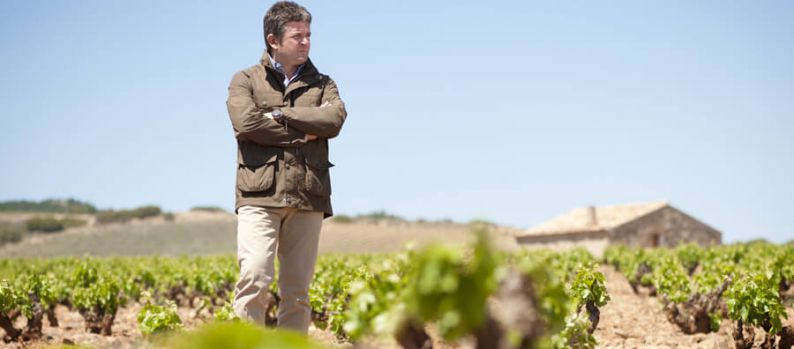 Álvaro Palacios in one of his vineyards
Álvaro Palacios in one of his vineyards
One of your personal challenges is in Priorat, how did you end up in Tarragona?
I was really impressed by the great classic wines while studying in France and when I returned to Rioja, I found the ambience to be somewhat industrial. It was difficult to find the kind of small vineyard I was after. The fact that I had lived outside the region for so long had given me another perspective and I did not mind changing region, so I looked in other areas. A family friend, René Barbier, called me up and suggested I come to Tarragona. After four years with Finca Dofi, I bought the l'Ermita vineyard in 1993 - it was the start of great things.
L'Ermita is the wine from this vineyard, can you tell us something about it?
It is like tending a garden, an indulgence. The wine is crystal purity, as the grapes go through more during the harvesting, it makes them more consistent. It is a transparent product, which elegantly expresses the qualities of the vineyard’s greenish, granitic slate soil and its quirky, cool, shady location, which faces north-east and out over the sea, reflecting the light and inhaling the sea breeze aromas.
How has the production of this wine evolved?
I have had two periods, the first was from 1994 to 2004, where there was 25% Cabernet from another vineyard, but I evolved and since 2006 I have made the wine with grapes exclusively from the l'Ermita vineyard. The classic wine is now 90% Granacha, 8% Samsó and 2% white varieties. Its restrained, sublime and delicate strength is captivating. Only 800 bottles were released in 2008, but usually there are around 1,500.
When you make a high-end wine like l’Ermita, what responsibility do you have?
The responsibility of an entire old world wine producing country.
Describe drinking L'Ermita…
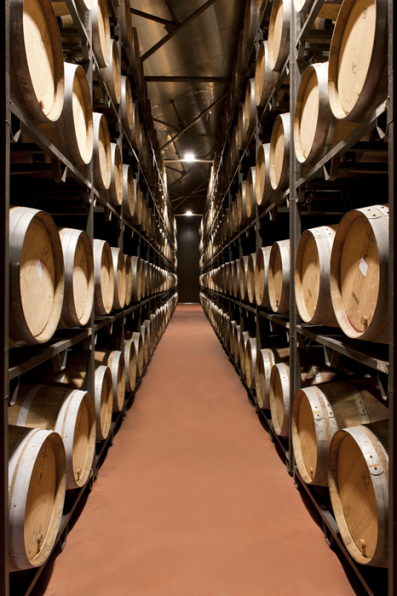 It is a wine of contained strength and energy, a wine of unique beauty, of exclusive indulgence. A wine of balance and sensitivity, sometimes you feel dizzy when you taste it. The grape is pure vegetable fibre, we find Mediterranean fruit aromas, fresh, vibrant red fruit, thyme flowers, mineral and acidic power which turns it into a secret elixir. Its structure is based on the acidity and minerality not on tannins. It is very lively and full of vitality.
It is a wine of contained strength and energy, a wine of unique beauty, of exclusive indulgence. A wine of balance and sensitivity, sometimes you feel dizzy when you taste it. The grape is pure vegetable fibre, we find Mediterranean fruit aromas, fresh, vibrant red fruit, thyme flowers, mineral and acidic power which turns it into a secret elixir. Its structure is based on the acidity and minerality not on tannins. It is very lively and full of vitality.
What other ongoing projects do you have in Priorat?
We produce other wines such as Camins del Priorat, Les Terrasses and Finca Dofí, but I would like to mention that we have created the vi de vila/village wine D.O in Priorat. This means you can collectively use the name of the village for the wine’s origin, which is very interesting because, after all, we drink places not people. Now we can drink the Vi de la Vila Gratallops from Alvaro Palacios
The Descendientes de J. Palacios bodega is one of your personal businesses, how did it come about?
It was the cumulation of luck and circumstance. I share the business in Bierzo with my nephew, Ricardo, who has the same passion for great classic wine as I do. The area was very underrated and it was a huge challenge, going totally against the grain back in 1999. We produce regional wine such as Pétalos, village wine such as Villa de Corullón and single vineyard wine such as Las Lamas, Moncerbal and La Faraona, an almost supernatural wine.
From all the wines bearing your signature as winemaker, of which are you most proud or have the fondest memories?
As Alejandro Fernandez of Pesquera used to say, "wines are like children, some good, some better." So I am proud of all of them in one way or another, I enjoy drinking the great classic wines and I am responsible for vineyards such as La Faraona or L'Ermita. I studied in France and when I returned to Spain, I decided I wanted to find small, top quality vineyards where I could make fine wines for all wine lovers. I think that we are getting there and this fills me with professional pride.
What do you think of the Parker scores?
I agree with them. I have always received high scores, for example L'Ermita has never been awarded less than 96 points. But my wines are not "Parker style", where the most successful wines are the more upfront ones. Robert Parker and other tasters are very professional but they still have their own, personal tastes.
Do you think that the D.O.s are restrictive for the winemaker?
I think it is important to have the D.O.s, but I think that tighter administrative control is needed. It is a pity that 'regional' is the highest category of D.O. in Spain, we need to be protecting smaller areas within the region more.
Priorat is the first to have taken a step toward a more concrete D.O. I think Spain’s very broad territorial designations of origin are a bad thing. The time has come to designate and protect the best villages, small local areas and exceptional vineyards in Spain.
Quick wine test
To make a good wine you need:
The best vines.
A special variety of grape is:
The native grape of the place i.e. the grape that has developed a perfect affinity with the earth and the climate.
A glass of wine should be accompanied by:
The right time to drink it, which means the desire to drink it, and also the best company, not necessary your nearest and dearest, but people who are the most appreciative and fun.
For you wine is:
My life and my liberty.


